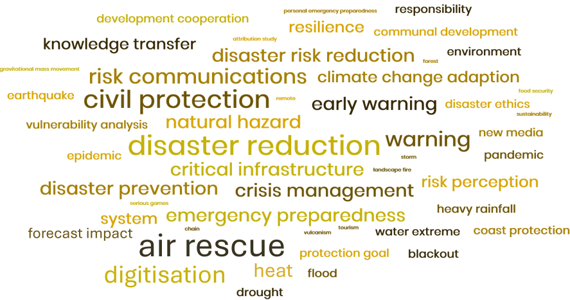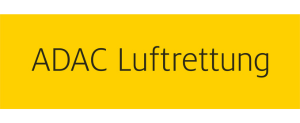DKKV Promotional Award
The DKKV Promotional Award was launched by the German Committee for Disaster Risk Reduction in 2018 and has since been awarded annually to recognise current research and best practice examples related to disaster risk reduction and disaster risk management. As the promotion of young scientists is particularly important to DKKV, the award is aimed primarily at young professionals.
The prize is aimed at German and English-language Bachelor’s and Master’s theses and is awarded to both the best Bachelor’s and the best Master’s thesis. These are honoured with prize money of €500 (Bachelor) and €1,000 (Master) as well as a two-year membership as a Young Professional in the DKKV.

DKKV Promotional Award 2025
The prize is awarded to final theses that contribute to DKKV’s vision:
“Creating a resilient society through sustainable crisis and disaster preparedness”.
In this context, the submitted thesis should address one or more of the topics listed in the word cloud for the award. This year, the focus will be on operational disaster prevention in particular – we therefore encourage you to submit work on topics such as emergency medical care or the role of air rescue.

Sponsor of the DKKV Promotional Award
We would like to thank our institutional member ‘ADAC Luftrettung’ for their kind support of the DKKV Promotional Award 2025! ADAC Luftrettung has been a central component of the rescue service system in Germany for over 50 years and is one of the largest air rescue organisations
in Europe. Together with emergency doctors and specialised rescue personnel, it ensures the highest medical and flight operational standards in order to help people in need as quickly as possible. By sponsoring the DKKV Promotional Award 2025, ADAC Luftrettung is setting an example for the future of disaster prevention – ‘Against time and for life’!
Would you like to find out more about ADAC Luftrettung? Click here to go to the homepage.
Jury members 2025

Franziskus Hören-Bayer
Henkel AG & Co. KGaA
former TÜV Rheinland Group

Prof. Dr.-Ing. habil. Norbert Gebekken
University of the Bundeswehr Munich

Inga Hennig-Finke
German Red Cross Local Association Wülfrath

Dr. Susanna Mohr
Centre for Disaster Management and Risk Reduction Technology (CEDIM)

Dr. Martin Schiffarth
ADAC Luftrettung
Award winner 2025
In 2025, the DKKV Promotional Award was sponsored by the ADAC Luftrettung.
Luisa Fuest, a graduate of RWTH Aachen University, receives the DKKV Promotional Award 2025 in the Bachelor’s category for her outstanding thesis entitled
‘Development of a QGIS plugin for quantifying building damage during floods’.
The thesis presents the development of a QGIS plugin for the simple and rapid analysis of satellite-based flood data. The aim is to provide an accessible and automated method for evaluating flood events that can be used without in-depth GIS knowledge. The plugin processes and visualises data from the Global Flood Monitoring System (GFM) and links it to building areas to determine flooded buildings and the duration of flooding. Case studies in Pakistan and Germany demonstrate the potential and limitations of the developed tool and enable a critical discussion of existing uncertainties and possible further developments.
2nd place: Katharina von Zadow (iu International University): ‘Motivation for voluntary work in disaster control and the willingness of the population to provide spontaneous help in the event of a disaster’
3rd place: Nadja Festor (Rhine-Waal University of Applied Sciences): ‘Systemic Difficulties in Development Cooperation – Providing Insight into Complex Problems through a Serious Game’
Cennet Abs, a graduate of the University of Bonn, took first place in the Master’s category for her outstanding thesis entitled
‘Needs analysis and concept for a teaching compendium on civil protection for school classes 10 to 12’.
In her Master’s thesis, Cennet Abs addresses the question of how self-protection and self-help skills can be effectively and sustainably promoted among the population: general education on topics relevant to civil protection is a central component of social resilience. Schools can address this need and promote self-protection and self-help skills in a sustainable manner. The framework concept for a teaching compendium is based on a detailed analysis of the current situation and needs of the material teaching resources available against the backdrop of current (geo)political developments; makes thematic and didactic suggestions for integrating topics relevant to civil protection into teaching; discusses the possible form of the compendium as a collection of material in coordinated teacher and student booklets; develops an evaluation and further training concept for the compendium; and discusses the overarching political, social and media dimensions in which the introduction of such a compendium would have to be accompanied.
2nd place: Julian Schöne (United Nations University and University of Bonn): ‘Human-caused Wildfire Ignition Assessment – A Comparison of Different Regions in Europe, Using Remote Sensing and Geodata’
3rd place: Joana Peiter (University of Bonn): ‘The Effects of Heat in Cologne Daycare Centres:
A Mixed-Methods Approach to Investigating Heat Stress and Coping Strategies’
Award winner 2024
In 2024, the DKKV Promotional Award was sponsored by the DRF Luftrettung.
Leonie Eberhardt, a graduate of Ludwig-Maximilians-Universität München, receives the DKKV Promotional Award 2024 in the Bachelor’s category for her outstanding thesis entitled
‘Opportunities and challenges of the digitalisation of warning systems in disaster management’.
The thesis examines the role of modern warning systems in disaster management, with a particular focus on the digital transformation and its opportunities and challenges. In particular, the needs of vulnerable population groups are taken into account in order to promote an inclusive warning system. Two central questions guide the analysis: firstly, whether a combination of digital and traditional warning tools in the national warning system makes sense, and secondly, how the warning of vulnerable groups in the event of a disaster can be improved. The work highlights the opportunities and challenges of digitalisation and examines the synergies of a hybrid warning system.
You can view the entire paper here.
2nd place: Sarah Schanz (University of Hagen): ‘Influence of information transparency on the motivation of firefighters in North Rhine-Westphalia’
3rd place: Annika Finkbeiner (Rhine-Waal University of Applied Sciences): ‘A Comparative Case Study on the Emergency Medical Teams Initiative: Evaluating the Effectiveness of Humanitarian Aid Providers’ Disaster Response in Haiti in 2010 and 2021′
Paula Gnielinski, a graduate of the University of Potsdam, took first place in the Master’s category for her outstanding thesis entitled
‘Governance Capacity in Public Crisis Management Extreme Weather and its Challenges for the Administration’.
In her Master’s thesis, Paula Gnielinski examines how the governance capacity of local administration influenced crisis management during the flood disaster in western Germany in 2021. The thesis sheds light on how well administrations can respond to crises and what administrative skills are required to do so. The analysis is based on the concept of governance capacity, which is divided into four dimensions: analytical, regulation, delivery and coordination capacity. This model helps to identify key challenges in crisis management and to take into account the different phases of a crisis.
2nd place: Alina Trippe (Rheinische Friedrichs-Wilhelms-Universität Bonn): ‘General practitioner care under the conditions of the flood disaster in the district of Ahrweiler 2021 – consequences for the crisis management of outpatient medical care’
3rd place: Angela Rödler (Rheinische Friedrichs-Wilhelms-Universität Bonn): ‘Coordination of spontaneous helpers in disaster situations’
Award winner 2023
In 2023, the DKKV Sponsorship Award was sponsored by the German Red Cross (DRK).
Jana Wiedemann, graduate of the Berlin School of Economics and Law, receives the DKKV Sponsorship Award 2023 in the Bachelor’s category for her outstanding thesis entitled
“Crisis resilience of emergency food provision in Germany”.
In her thesis, Jana Wiedemann deals with the resilience of emergency food provision in Germany, which is becoming increasingly important in view of the coronavirus pandemic and Russia’s war of aggression against Ukraine. To this end, she conducts document analyses and expert interviews as part of a case study. In addition to the crisis management of the actors, current challenges, problems and solutions are also addressed. The results are categorised and evaluated on the basis of theoretical core capabilities of resilience. The Frauenhofer Institute’s resilience model serves as the basis for this.
You can view the entire paper hier.
2nd place: Paul Berg (Universität zu Köln): „ENVI-met basierte Simulation der Wirkung unterschiedlicher Baumarten auf das Mikroklima in der Südstadt in Köln während eines Hitzeereignisses“
3rd place: Julia Feth (Universität Bonn): „Geomorphologische Auswirkungen des Starkregenereignisses im Juli 2021 auf das Einzugsgebiet des Aulbachs (Ahrtal)“
Fabian Rackelmann, a graduate of the United Nations University and the University of Bonn, was awarded first place in the Master’s category for his outstanding thesis entitled
“Integration of forest health aspects in flood risk reduction Implementation, trade-offs, and synergies of distinct forest management objectives”.
While healthy forest ecosystems provide various services that reduce flood risk, they can also contribute to flooding by providing wood that may contribute to watercourse blockages and the associated backwater effects. In this context, deadwood as a key aspect of healthy forests is often at the centre of discourses in the post-flood period. The master thesis addresses this ambivalence by analysing the relationship between the two objectives of forest management, forest health and flood risk reduction. With the help of 19 investigative semi-structured expert interviews with 20 stakeholders from the fields of forestry, water management and nature conservation, possible challenges and approaches for an increased implementation of flood risk-sensitive forest management in these regions were analysed for the Rhineland-Palatinate part of the Ahr catchment area as an example.
Fabian Rackelmann’s peer-reviewed paper “Synergies and trade-offs in the management objectives forest health and flood risk reduction“ served as the basis for the master’s thesis
2nd place: Michael Bartz (Universität Bonn & BBK): „Zusammenarbeit zwischen staatlichen Behörden und Spontanhelfenden –Optimierungsansätze zur Koordinierung von Spontanhelfenden am Beispiel der Flutkatastrophe 2021 in Stolberg (Rhld.)“
3rd place: Angela Marie Bungert (United Nations University & Universität Bonn): „Assessing the Role of Disaster Risk Education in Secondary Schools in Light of Community Resilience“
Award winner 2022
In 2023, the DKKV Sponsorship Award was sponsored by the THW-Foundation gefördert.
Graduate of the Akkon University of Applied Sciences Berlin, receives the DKKV Sponsorship Award 2022 in the Bachelor’s category for his outstanding thesis entitled
“Die Stabsarbeit der Einsatzleitung Starkregen – Selbst-und Fremdwahrnehmung und Implikationen für künftige Entwicklungen“
Sebastian Herbe dealt with the flood disaster in July 2021, which represented a maximum result for German civil protection. As part of the research project, 17 experts who were active in the heavy rain incident command as leaders in staff or at lower management levels were interviewed in order to identify reasons for a different self-perception and causes for the inadequate functioning of the management system. The aim of the research project was to explore the causes for a divergent self-perception and external perception of the staff work of the heavy rain incident command, to reveal problem areas and to derive implications for future developments of the established command systems from the knowledge gained.
2nd place: Sari Rombach: “Risikoanalyse eines extremen Starkregenereignisses in Bonn –eine GIS-gestützte Untersuchung“
3rd place: Elaine Donderer: “Rethinking Resilience – The Urban Political Ecology of Informal Settlements and Participatory Disaster Risk Reduction: A Comparative Case Study of Informal Settlements in Soweto and Belgrade”
Graduate of the Cologne University of Applied Sciences, receives the DKKV Sponsorship Award 2022 in the Master’s category for his outstanding thesis entitled
“Methode zur Bewertung der Notfallplanung von Krankenhäusern im Bereich der Energieversorgung”
Chris Hetkämper’s work focussed on the question of how emergency planning for energy supply in hospitals can be evaluated. The work developed a method that provides hospital operators with an opportunity to evaluate and optimise their existing emergency planning in the area of energy supply. Technical and organisational aspects as well as vulnerability were taken into account as framework parameters in order to avoid a failure of the emergency power supply due to damage events.
2nd place: Florence Nick: “Resilience of people with disabilities in Germany during the Covid 19-pandemic”
3rd place: Nathalie Sänger: ” Exploring factors that influence urban planner`s behavior towards green infrastructure for climate change adaptation in Bonn”
Award winner 2021
Graduate of Kiel University of Applied Sciences, received the DKKV Sponsorship Award 2021 in the Bachelor’s category for his outstanding thesis entitled
“Entwicklung einer Aktivierenden Befragung im sozialraumorientierten Bevölkerungsschutz Ein Beitrag der Sozialen Arbeit zur Aktivierung einer Selbstschutz- und Selbsthilfekompetenz bei Bürger*Innen für eine stärkere gesellschaftliche Resilienz gegenüber Notlagen und Schadensereignissen”.
In his work, he dealt with the question of the extent to which an activating survey in social work can contribute to activating and promoting the self-protection and self-help skills of citizens in the context of social space-oriented civil protection in order to positively influence social resilience to emergencies in the long term. The aim was to make an activating survey applicable as a social work method for civil protection.
Graduate of the University of Cologne, received the DKKV Sponsorship Award 2021 in the Master’s category for her outstanding thesis entitled
“Geomorphological and sedimentary impacts of exceptional precipitation events on a dry valley in the Andean Precordillera (Tarapacá region, N Chile)”.
Her focus was on the geomorphological and sedimentological investigation of exceptional precipitation and flood events in the Atacama Desert, not only against the background of palaeoclimatic reconstruction. Rather, her Master’s thesis aimed to generate a fundamental understanding of the intensity and frequency of these rare but serious and dangerous flood events, while also providing starting points for future investigations.
Award winner 2020
In 2020, the DKKV sponsorship prize was awarded with the support of the German Aerospace Centre (Deutsches Zentrum Luft- und Raumfahrt e.V.). Bachelor’s and Master’s theses written on the topic of “resilience” could be submitted.
A graduate of the Joint Master’s programme “Geography of Environmental Risks and Human Security” at the United Nations University and the Rheinische Friedrich-Wilhelms-Universität in Bonn, convinced the jury with her Master’s thesis. She dealt with the topic
“Drought Risk Assessment in Zimbabwe: A Spatial Analysis of Hazard, Exposure and Vulnerability”.
To assess the drought risk in Zimbabwe, she carried out a remote sensing-based analysis of data on the health status of vegetation in Zimbabwe from 1989-2019. She combined in-depth literature review with an expert survey to identify, select and prioritise relevant indicators of drought vulnerability. Combined with data on exposure, she was able to calculate the drought risk index, which can be used to optimise drought risk management and thus strengthen the resilience of the population.
Award winner 2019
For the second time, the German Committee for Disaster Reduction (DKKV) has awarded the DKKV “Preparedness 2030” prize in cooperation with the German Climate Foundation. In his master’s thesis at the United Nations University with the topic
“The Role of Social-psychological Factors for the Adaption of Domestic Rainwater Harvesting as a Measure of Adapting to Urban Water Scarcity in Rondebosch, Cape Town”
Dominic Sett analysed rainwater harvesting as an adaptation strategy to increasing water scarcity in a suburb of Cape Town. The results of the work show that social-psychological factors should be given more attention in cost-benefit analyses and other adaptation strategies in order to further strengthen the resilience of (water) systems in Cape Town. The complexity and topicality of the topic convinced the jury.
Award winner 2018
The German Committee for Disaster Risk Reduction (DKKV), in cooperation with the German Climate Foundation, awarded the “Preparedness 2030” prize for the first time on 5 October 2018. After a thorough examination of all the work, the prize was awarded to two people, Johanna Stötzer and Katharina Seeger!
Katharina Seeger wrote her bachelor thesis at the University of Cologne on the topic
“Characterisation of modern tropical cyclone deposits at Chaung Thar by applying sedimentological and luminiscene dating approaches – towards using sedimentary evidence for long-term hazard assessment in Myanmar”
dedicated. To this end, she analysed recent and historical sedimentary deposits of tropical cyclones with regard to their character, composition, age and size, among other things, in order to draw conclusions about the relevance of sediment analyses and luminescence dating for hazard assessment. The additional method of luminescence dating used proved to be an important tool for creating a chronological framework.
Johanna Stötzer wrote her master’s thesis at the Karlsruhe Institute for Technology (KIT) on the topic of
“Development of a generic concept to analyse the accessibility of emergency facilities in critical infrastructure”
and developed generic and modular approaches to analyse the accessibility of emergency facilities in critical road infrastructure on several scale levels. Their work represents a valuable decision-making aid for the regional planning of a road network.

